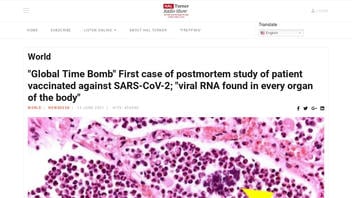STORY UPDATED: check for updates below.

Did the first case of postmortem study of a patient vaccinated against SARS-CoV-2 find viral RNA in every organ of the body? No, that's not true: Researchers found viral RNA in seven of the nine organs they analyzed. "This is not even the majority of all human organs," the study's authors wrote to Lead Stories. The claim was one of several in an article about the study that its authors said fundamentally distorted the facts.
The claims appeared in an article (archived here) published by the Hal Turner Radio Show on June 13, 2021. Titled "'Global Time Bomb' First case of postmortem study of patient vaccinated against SARS-CoV-2; 'mRNA found in every organ of the body,'" it opened:
The first-ever autopsy of a person vaccinated against COVID-19, who tested negative 18 days later upon hospital admission but at 24 days after the VAX, has revealed viral RNA was found in almost every organ of the body. The vaccine, while triggering an immune response, DID NOT STOP the virus from entering every organ in the body.
Users on social media saw this title, description and thumbnail:
"Global Time Bomb" First case of postmortem study of patient vaccinated against SARS-CoV-2; "mRNA found in every organ of the body"
The first-ever autopsy of a person vaccinated against COVID-19, who died about 24 days later, has revealed mRNA FROM THE VACCINE, was found in...
Lead Stories reached out to Dr. Torsten Hansen with the Institute of Pathology, University Hospital OWL of the University of Bielefeld, Campus Lippe, in Detmold, Germany, to ask about the article's claims. He is listed as lead author of the study, which can be read here.
In an emailed statement on June 17, 2021, the study's authors wrote:
The conclusions made by Turner based on our case report are absolutely misleading and in particular nearly always completely contradictory to our suggestions.
And later:
It is with great dismay that we distance ourselves from Turner's distorted presentation of the facts.
The researchers made several points, the first of which was to stress that the study was a case report, a type of medical publication that describes an extraordinary patient history or specific feature. Results of such reports should be interpreted with great care. In order to draw general conclusions about patients vaccinated against the virus, they wrote, a much larger group would be needed.
Second, the authors pointed out -- as is clear from the study -- that the patient only received the first dose of the Pfizer-BioNTech COVID-19 vaccine, which requires two doses. They wrote:
In particular, this fact has been completely ignored by Turner. Thus, it is well known that immunogenicity against SARS CoV2 is fully established not before two weeks after the second vaccination. Nevertheless, we found it could be interesting to reveal a first result by this case report what kind of immunogenicity might be established after the first vaccination. It is more than shocking that Turner misused our results on that way.
Third, they disputed the article's assertion that "the vaccinated man actually got COVID." They concluded the patient died from bacterial pneumonia. Researchers drew a distinction between COVID-19, the disease, and SARS-CoV2, which is the virus that causes the disease. They wrote:
Our patient, though being positive for SARS CoV2 did not die from COVID19. We suggest immune response due to vaccination was able to prevent COVID19.
Relatedly, the authors took issue with the following statement in the article: "Patient was given the vaccine, it got him hospitalized with ulcerative colitis due to blood clots." They said it was unclear how Turner would arrive at such a conclusion, given the study, and that they did not discover any specific finding that could be interpreted as a side effect of the shot. They wrote:
The patient did not suffer from ulcerative colitis, but from ischemic colitis.
And later:
Our patient suffered from severe arteriosclerosis which may also affect the vessels supplying the intestinal tract. In specific regions of the bowel such as the left colonic flexure these vessels are particularly susceptible for vessel damage by arteriosclerosis. Subsequently, the respective part of the bowel develops inflammatory disease, called ischemic colitis. However, we did not observe blood clots and yet did not describe these features. Moreover, in the patient's history, we found a similar finding of ischemic colitis about 15 years ago (not described in the paper). In addition, we did not detect viral RNA in the tissue probes of the actual endoscopic investigation of the large bowel. Taken together, the ischemic colitis is the cause of the diarrhea and it is not induced by vaccination.
In sum, the authors of the study that was the subject of an article published by the Hal Turner Radio Show strongly disagreed with how their research was portrayed. That's relevant, as they may reasonably be considered the experts on their own work.
Lead Stories reached out to the Hal Turner Radio Show to ask for a response to the authors' explanations. In an email, dated June 17, 2021, Turner acknowledged that the researchers analyzed just nine organs and found viral RNA in seven, but stressed that those seven organs are vital. He also argued for the significance of a single case report and dismissed the notion that the study's authors may be uniquely positioned to draw conclusions from their own research. Turner wrote:
Their study was a case report whose facts stand on their own. Whether THEY would make generalizations or not is irrelevant. Their choice is not everyone else's choice. The facts are the facts. People draw their own conclusions.
Updates:
-
2021-06-18T17:00:34Z 2021-06-18T17:00:34Z Updated to include a response from Hal Turner.















